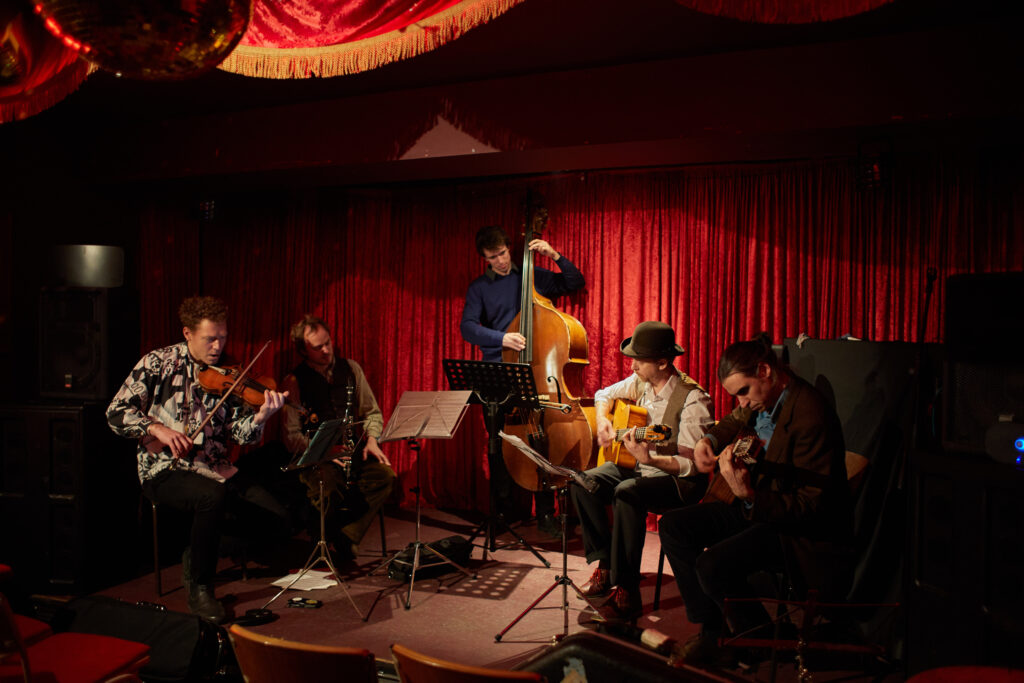Classical Music Special: Les Frères Fritz
VICTORIA KINGHAM visits St Leonard’s Crown House to review The Fritz Brothers – a Parisian inspired jazz/classical ensemble featuring director, arranger, and violinist Max Baillie, Ewan Bleach – clarinet and tenor saxophone, Frank Moon and John Kelly – guitars, Misha Mullov-Abbado on upright bass. From Hastings Independent Press.
Quaintly, one has to knock on the door to gain admission to this beautiful, Grade II listed, venue. From the outside, there is nothing to tell the casual onlooker that it houses a small bar – the Regency Room – and a stage of very superior quality, decorated in wonderful taste – warm greens and reds with strings of Chinese lanterns and vases of matching Alstroemeria gracing an alcove. Though designed by Sir James Burton and one of the oldest buildings in St. Leonards, there is a French feel to the function room, even down to the old-fashioned tinplate notice on the wall which appears to advertise a French shooting-range.
And French was the order of the evening. For the Fritz Brothers are a gypsy band that pays acknowledged homage to Django Reinhardt and the Hot Club de France in the 1930s, with the same instrumental line-up – two guitars, double-bass, lead violin and clarinet (and tenor sax). In terms of musical performance, this quintet, only on its third outing, could have few peers. The range of repertoire, their outstanding individual skills and instrumental versatility, and the happy inspiration behind their musical arrangements, would be hard to surpass.
The quintet, named for the Austrian virtuoso violinist Fritz Kreisler, is the brainchild of Max Baillie, band leader, lead violin and arranger. Max Baillie is also the organiser for St Leonards Concerts (of which more elsewhere) and has an impeccable classical pedigree, being a graduate of the Yehudi Menuhin School, Cambridge University and UdK Berlin. His musical background is intensely and happily diverse, ranging from Steve Reich to Zakir Hussein, Bobby McFerrin to Bjork. He is also, I would say, a startlingly brilliant musician. The arrangements were exceptional, giving space to each instrument from time to time as soloists, but also allowing the players to shine and co-operate during ensemble playing. The interplay of violin and clarinet, for example, during the Rachmaninov piece, was skilfully written and faultlessly performed.
Watching this group, it also soon became apparent that all of them could play anything. Individually they are virtuosos. The clarinettist, Ewan Bleach, picked up a tenor saxophone for the third number, which was a Django Reinhart classic, All of Me, unusually with an eight-bar introduction. They moved swiftly and impeccably through from jazz standards to arrangements of classical pieces – Bach’s Sarabande from the C-Minor cello suite, for example, and Schumann’s Träumerei (with a striking a capella introduction and the melody stated on the bass) were very impressive, arranged by and for this band in a unique way. Easy movement on to Irving Berlin’s Blue Skies then on again to Kabalevsky, Chopin, Schubert, all impeccably executed but without sounding contrived or precious – and even Schubert might have wiped away his frozen tears at this upbeat, exultant rendering of Staendchen.
The eclecticism of the evening, furthermore, echoed the whole event giving me great joy, and I look forward to this band developing and growing a well-deserved regular following.

